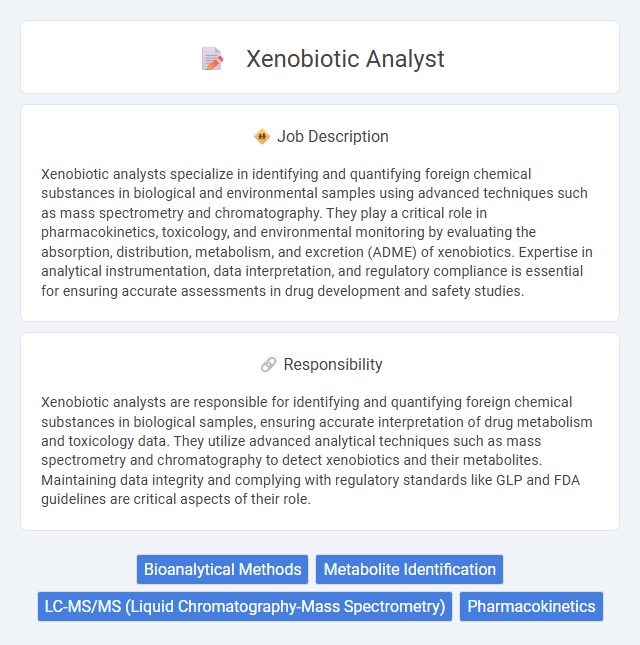
Xenobiotic analysts specialize in identifying and quantifying foreign chemical substances in biological and environmental samples using advanced techniques such as mass spectrometry and chromatography. They play a critical role in pharmacokinetics, toxicology, and environmental monitoring by evaluating the absorption, distribution, metabolism, and excretion (ADME) of xenobiotics. Expertise in analytical instrumentation, data interpretation, and regulatory compliance is essential for ensuring accurate assessments in drug development and safety studies.
Individuals with strong analytical skills and a keen interest in chemistry or pharmacology are likely suited for a xenobiotic analyst job, given the detailed nature of the work involving the study of foreign compounds in biological systems. People who are comfortable working in laboratory environments and can maintain high precision in data collection and interpretation have a higher probability of thriving in this role. Those who may struggle with repetitive tasks or lack attention to detail might find this position less suitable.
Qualification
A Xenobiotic Analyst typically requires a degree in pharmaceutical sciences, biochemistry, or a related field, with strong knowledge in drug metabolism and pharmacokinetics. Proficiency in analytical techniques such as LC-MS/MS, GC-MS, and HPLC is essential for accurate detection and quantification of xenobiotics. Experience in bioanalytical method development, validation, and data interpretation supports compliance with regulatory standards in drug safety assessment.
Responsibility
Xenobiotic analysts are responsible for identifying and quantifying foreign chemical substances in biological samples, ensuring accurate interpretation of drug metabolism and toxicology data. They utilize advanced analytical techniques such as mass spectrometry and chromatography to detect xenobiotics and their metabolites. Maintaining data integrity and complying with regulatory standards like GLP and FDA guidelines are critical aspects of their role.
Benefit
Xenobiotic analysts likely benefit from working in a specialized field that involves studying foreign compounds and their effects on biological systems, which may lead to high demand in pharmaceutical and environmental sectors. They probably enjoy opportunities for career advancement due to the growing need for expertise in drug metabolism and toxicology. Access to cutting-edge technology and collaborative research environments could further enhance job satisfaction and professional development.
Challenge
Xenobiotic analyst roles likely present the challenge of accurately identifying and quantifying foreign chemical substances within complex biological matrices. This position may require navigating the intricacies of advanced analytical instruments and adapting to evolving regulatory standards. The probability of encountering novel compounds that demand innovative problem-solving skills is high, making continuous learning essential.
Career Advancement
Xenobiotic analysts specialize in studying foreign compounds and their effects on biological systems, making them essential in pharmaceuticals and environmental research. Career advancement typically involves moving from laboratory technician roles to senior analyst or research scientist positions, often requiring advanced degrees such as a Master's or PhD in pharmacology or toxicology. Gaining expertise in analytical techniques like mass spectrometry and regulatory affairs can accelerate progression into project management or regulatory consultancy roles.
Key Terms
Bioanalytical Methods
Xenobiotic analysts specialize in bioanalytical methods to detect and quantify foreign compounds, including drugs, toxins, and environmental pollutants, within biological matrices. They utilize advanced techniques such as liquid chromatography-mass spectrometry (LC-MS/MS) and gas chromatography (GC) to ensure precise measurement of xenobiotics in plasma, urine, and tissue samples. Expertise in method development, validation, and regulatory compliance is essential for accurate pharmacokinetic and toxicokinetic studies in pharmaceutical and environmental research.
Metabolite Identification
Xenobiotic analysts specializing in metabolite identification utilize advanced techniques such as high-resolution mass spectrometry and liquid chromatography to detect and characterize drug metabolites in biological samples. This role requires expertise in interpreting metabolic pathways, biotransformation processes, and enzymatic activity to support drug development and safety assessments. Proficiency in software tools for spectral analysis and knowledge of regulatory guidelines are essential for accurate metabolite profiling and reporting.
LC-MS/MS (Liquid Chromatography-Mass Spectrometry)
Xenobiotic analysts specialize in detecting and quantifying foreign chemical substances in biological and environmental samples using advanced LC-MS/MS techniques. Mastery of Liquid Chromatography-Mass Spectrometry enables precise separation and identification of xenobiotics, ensuring accurate pharmacokinetic and toxicological assessments. Expertise in sample preparation, method development, and data interpretation is critical for regulatory compliance and drug safety evaluations.
Pharmacokinetics
Xenobiotic analysts specializing in pharmacokinetics evaluate the absorption, distribution, metabolism, and excretion (ADME) of foreign compounds in biological systems to optimize drug safety and efficacy. They utilize advanced analytical techniques such as liquid chromatography-mass spectrometry (LC-MS) to quantify xenobiotic substances and their metabolites in plasma and tissue samples. Their expertise supports drug development by predicting pharmacokinetic profiles and ensuring compliance with regulatory standards.
 kuljobs.com
kuljobs.com